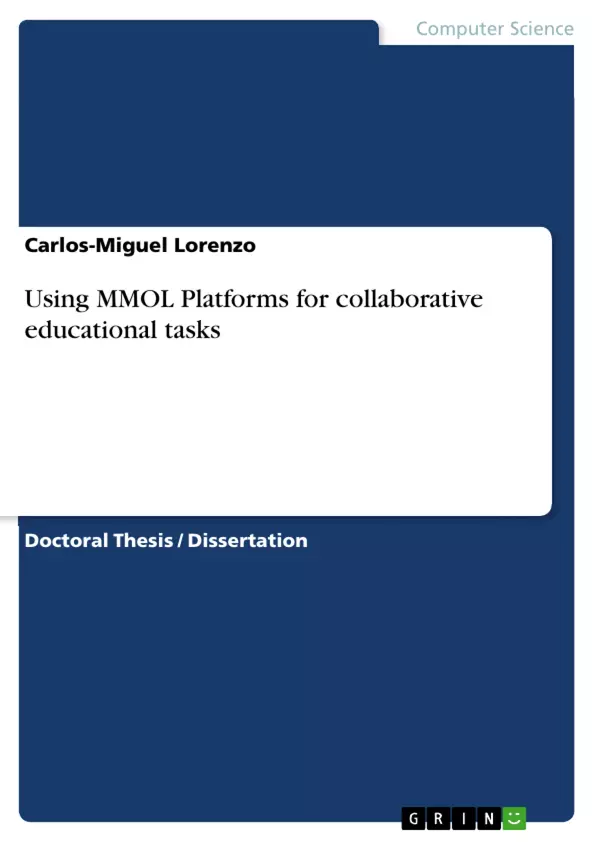Imagine a classroom where learning transcends the physical world, where students collaborate in dynamic, immersive environments, and where education becomes an adventure. This book delves into the transformative potential of Massively Multiplayer Online (MMOL) platforms in education, dissecting the challenges and opportunities that arise when these virtual worlds meet the pedagogical landscape. Explore the intricate dynamics of collaborative and cooperative learning within MMOL environments, uncovering how these platforms can foster engagement, enhance knowledge retention, and cultivate essential teamwork skills. Unravel the complexities of instructional design in virtual spaces, examining how educators can adapt their approaches to leverage the unique features of MMOLs and create truly enriching learning experiences. This study meticulously analyzes the impact of MMOLs on pedagogical strategies, providing insights into how educators can effectively integrate these technologies into their teaching practices. Navigate the specific issues that plague educational virtual worlds, from technical limitations to social dynamics, and discover innovative solutions to overcome these hurdles. Venture into the realm of simulation and online role-play, exploring how these powerful tools can transport students to different times and places, allowing them to experience history firsthand, solve complex problems in realistic scenarios, and develop critical thinking skills. This comprehensive exploration provides a robust framework for understanding the future of education in the digital age, offering invaluable guidance for educators, researchers, and developers seeking to harness the power of MMOLs to create engaging, effective, and transformative learning experiences, ultimately paving the way for a new era of collaborative, immersive, and student-centered education, focusing on research methodology, instructional design, and the potential of virtual worlds to revolutionize the learning paradigm by seamlessly integrating technology and pedagogy.
Inhaltsverzeichnis (Table of Contents)
- Chapter 1. Introduction. Problem & proposal.
- 1.1 Motivation
- 1.2 Overview
- 1.3 History
- 1.4 Conceptual framework and literature review
- 1.4.1 Educational virtual world's issues.
- 1.4.2 Collaborative and cooperative learning analysis.
- 1.4.3 Simulation and on-line role-play questions.
- 1.4.4 Instructional design problems.
- 1.5 Problem addressed.
- 1.6 Research Agenda
- 1.7 Research Objectives
- 1.8 Method overview
Zielsetzung und Themenschwerpunkte (Objectives and Key Themes)
This PhD thesis investigates the use of MMOL (Massively Multiplayer Online) platforms for collaborative educational tasks. The primary objective is to analyze the challenges and opportunities presented by using such platforms in educational settings. The research explores the potential benefits and drawbacks, examining the impact on collaborative learning and instructional design.
- Challenges and opportunities of using MMOL platforms in education.
- Analysis of collaborative and cooperative learning within MMOL environments.
- Impact of MMOL platforms on instructional design and pedagogical approaches.
- Examination of specific issues related to educational virtual worlds.
- Exploration of simulation and online role-play within the context of MMOL platforms.
Zusammenfassung der Kapitel (Chapter Summaries)
Chapter 1. Introduction. Problem & proposal.: This introductory chapter sets the stage for the entire thesis. It establishes the motivation behind the research, providing a background on the use of MMOL platforms in education. The chapter also outlines the historical context, detailing previous work and research in the field. Crucially, it presents a comprehensive literature review, examining existing research on educational virtual worlds, collaborative learning, simulation and role-play, and instructional design challenges. This review lays the groundwork for identifying the specific problem addressed by the thesis and articulates the research agenda, objectives, and methodology. The chapter's significance lies in its clear establishment of the research question and its thorough exploration of the relevant literature, creating a robust foundation for the subsequent chapters. The integration of various research areas (virtual worlds, collaborative learning, instructional design) is particularly noteworthy, highlighting the interdisciplinary nature of the study.
Schlüsselwörter (Keywords)
MMOL platforms, collaborative learning, educational virtual worlds, instructional design, simulation, online role-play, cooperative learning, research methodology.
Häufig gestellte Fragen
Was ist das Thema dieses Dokuments?
Dieses Dokument ist eine umfassende Sprachvorschau, die Titel, Inhaltsverzeichnis, Ziele und Themenschwerpunkte, Kapitelzusammenfassungen und Schlüsselwörter enthält. Es bietet einen Überblick über eine Dissertation, die die Verwendung von MMOL-Plattformen (Massively Multiplayer Online) für kollaborative Bildungsaufgaben untersucht.
Was ist das Hauptziel der untersuchten Dissertation?
Das Hauptziel ist die Analyse der Herausforderungen und Chancen, die sich aus der Verwendung solcher Plattformen in Bildungsumgebungen ergeben. Die Forschung untersucht die potenziellen Vorteile und Nachteile und untersucht die Auswirkungen auf kollaboratives Lernen und Instructional Design.
Welche Schlüsselthemen werden in dieser Dissertation behandelt?
Die Schlüsselthemen umfassen: Herausforderungen und Chancen bei der Nutzung von MMOL-Plattformen in der Bildung, Analyse von kollaborativem und kooperativem Lernen in MMOL-Umgebungen, Auswirkungen von MMOL-Plattformen auf Instructional Design und pädagogische Ansätze, Untersuchung spezifischer Probleme im Zusammenhang mit virtuellen Bildungswelten sowie Erforschung von Simulationen und Online-Rollenspielen im Kontext von MMOL-Plattformen.
Was behandelt Kapitel 1?
Kapitel 1 ist eine Einleitung, die das Problem und den Lösungsvorschlag umreißt. Es behandelt die Motivation hinter der Forschung, den historischen Kontext, einen umfassenden Literaturüberblick zu Themen wie virtuelle Bildungswelten, kollaboratives Lernen, Simulationen und Rollenspiele sowie Herausforderungen im Instructional Design. Es identifiziert das spezifische Problem, das in der Dissertation behandelt wird, und formuliert die Forschungsagenda, Ziele und Methodik.
Welche Schlüsselwörter sind mit dieser Dissertation verbunden?
Die Schlüsselwörter umfassen: MMOL-Plattformen, kollaboratives Lernen, virtuelle Bildungswelten, Instructional Design, Simulation, Online-Rollenspiel, kooperatives Lernen und Forschungsmethodik.
Was ist der Zweck des Inhaltsverzeichnisses?
Das Inhaltsverzeichnis bietet eine strukturierte Übersicht über die Kapitel und Unterabschnitte der Dissertation und hilft den Lesern, die Organisation und den Umfang der Forschung zu verstehen.
Was ist die Bedeutung der Kapitelzusammenfassungen?
Die Kapitelzusammenfassungen bieten prägnante Übersichten über den Inhalt jedes Kapitels und ermöglichen es den Lesern, die wichtigsten Argumente und Ergebnisse der Dissertation schnell zu erfassen.
Wer ist die Zielgruppe für diese Forschung?
Die Zielgruppe umfasst Pädagogen, Forscher und Entwickler, die sich für die Nutzung von MMOL-Plattformen im Bildungsbereich, kollaboratives Lernen und Instructional Design interessieren.
- Citar trabajo
- Carlos-Miguel Lorenzo (Autor), 2014, Using MMOL Platforms for collaborative educational tasks, Múnich, GRIN Verlag, https://www.grin.com/document/511993



